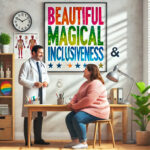A case of ‘a little bit of Bulimia’
A case of ‘a little bit of Bulimia’

This little booklet can help save a life. Download it and ensure you local doctor has a copy. Together with F.E.A.S.T. members Carolin Gray (left) and Bridget Bonnin (right), I distributed these booklets at the 2011 ANZAED conference. We will be doing it again at the 2012 conference, and we plan to have one for every participant at Australia's first family conference on eating disorders, Brisbane, May 2013.
“A little bit of Bulimia never hurt anyone.”
It’s hard to believe, and you surely won’t want to believe it, but a doctor said this to a young woman in an Australian country town. The doctor dismissed the young woman with this ‘advice’ eight years ago. Bulimia has been a diagnosable illness for more than 40 years. Bulimia is an illness that can lead to death. The doctor’s advice borders on gross negligence.
[I’ll never forget how hard it was to confide the ‘secret’ of my Bulimia to a GP in this same country town, in the late 1970s. The doctor did not know much about eating disorders but at least he did not dismiss me. To his credit, he did try to help. If he had said ‘a little bit of Bulimia never hurt anyone’ to me, I would have gone home feeling gutted and wretched. Desperate for help and already suicidal, I quite likely would have ended my life.]
Back to 2012: The young woman’s mother emailed over the weekend, very worried. Eight years on that ‘little bit of Bulimia’ is hurting her daughter, and her family, badly. The mother does not know where to turn for help.
After seeing red for quite some time I responded: ‘I hope that doctor is not still seeing patients.’ The mother replied: ‘Yes, he is a leading doctor in the town.”
Ugh.
When doctors don’t know what they are talking about, what can parents do?
The daughter with Bulimia is ‘beautiful, active and intelligent, with good a heart’, her mother writes, ‘but she suffers and I just don’t know what to do to help her. She feels that I haven’t done enough to help her and I guess I haven’t, as she is still so unwell. I don’t know what to do.’
The daughter manages her disorder sometimes and then relapses.
Mother: ‘We have engaged many psychologists and our daughter has even spent time in a psych ward in a capital city. She is still so unwell.’
Firstly, I hasten to reassure this mother that she is in no way responsible for her daughter’s illness. And the good news is that there are things she can do to help not only her daughter, but herself. This is important, because an eating disorder takes a toll on every member of the family.
Over coming weeks, I aim to provide information about tools that parents can employ in their bid to help their loved one. “Action beats anxiety,” as my psychiatrist says.
Let’s start with first base: the local family doctor. Every doctor in the world needs a copy of Eating Disorders: Critical Points for Early Recognition and Medical Risk Management in the Clinical Care of Individuals with Eating Disorders. This 10-page brochure has been developed by the Academy of Eating Disorders Medical Care Standards Task Force to provide critical education for all physicians and other medical care professionals in the early detection and medical risk management of eating disorders in children, adolescents and adults.
You can download it right here.
The booklet is in an easy-to-read format for time-strapped medical care professionals who are the first point of contact when seeking help. The booklet highlights critical diagnostic and medical management information that is essential knowledge for doctors who are in a position to provide early detection, medical care, and treatment referral for patients with eating disorders and their families. If the doctor in the Australian country town had read this booklet eight years ago, the scenario could have had a much brighter outcome for the young woman with Bulimia.
Bulimia nervosa: This can be a secretive and therefore hidden illness. Any signs of bingeing and purging should be taken seriously. This illness is characterised by a cycle of bingeing and compensatory behaviours such as self-induced vomiting designed to undo or compensate for the effects of binge eating. Deep feelings of shame, in addition to serious physical effects, are associated with this illness. It is very important to reach out for help – if the first doctor does not understand, go immediately to another. Seek a referral to an eating disorder specialist. Don’t delay and don’t take ‘no’ for an answer. ‘A little bit of Bulimia’ can quickly turn into a life sentence.





